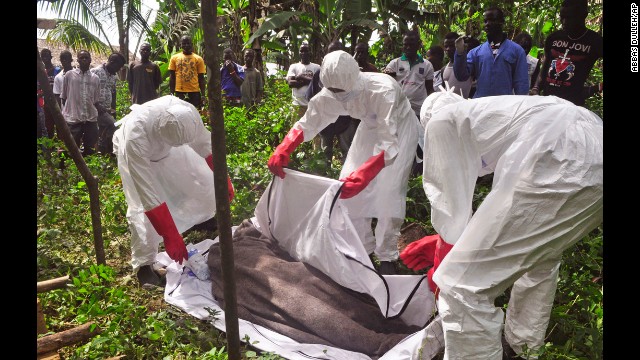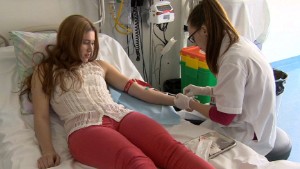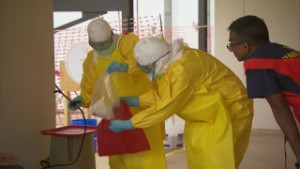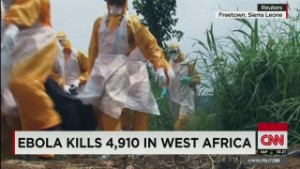Results 1 to 1 of 1
Thread Information
Users Browsing this Thread
There are currently 1 users browsing this thread. (0 members and 1 guests)
-
10-31-2014, 09:05 PM #1
Canada to stop processing visas from Ebola hot spots in West Africa
Canada to stop processing visas from Ebola hot spots in West Africa
By Ralph Ellis, CNN
updated 6:05 PM EDT, Fri October 31, 2014
 according to the World Health Organization." border="0" height="360" id="articleGalleryPhoto001" width="640" style="padding: 0px; margin: 0px auto; border: 0px; font-weight: inherit; font-style: inherit; font-size: 11.1999998092651px; font-family: inherit; vertical-align: baseline;">Health workers in Monrovia, Liberia, cover the body of a man suspected of dying from the Ebola virus on Friday, October 31. Health officials say the Ebola outbreak in West Africa is the deadliest ever. More than 4,900 people have died there, according to the World Health Organization.
according to the World Health Organization." border="0" height="360" id="articleGalleryPhoto001" width="640" style="padding: 0px; margin: 0px auto; border: 0px; font-weight: inherit; font-style: inherit; font-size: 11.1999998092651px; font-family: inherit; vertical-align: baseline;">Health workers in Monrovia, Liberia, cover the body of a man suspected of dying from the Ebola virus on Friday, October 31. Health officials say the Ebola outbreak in West Africa is the deadliest ever. More than 4,900 people have died there, according to the World Health Organization.
STORY HIGHLIGHTS
- NEW: Canada will stop accepting visa applications from Ebola hot spots, official says
- U.N. Ebola coordinator issues statement on quarantines for 3 West African nations
- U.S. ambassador to the UN commends Cuba for sending health workers to Africa
- WHO: 4,951 deaths and 13,567 cases of Ebola up to October 29
(CNN) -- Canada will stop processing visa applications from foreign nationals who have visited West African nations with large outbreaks of the Ebola virus, Citizenship and Immigration Minister Chris Alexander said Friday.
Applications will be returned to people from Ebola hot spots who have already applied for visas, officials said in a press release.
The changes do not affect Canadians currently in West Africa, the press release said. Health care workers in West Africa will be permitted to travel back to Canada.
The action is similar to that taken by Australia several days ago.
"Our number one priority is to protect Canadians," Alexander said. "We continue to work with domestic and international partners to aid efforts to respond to the outbreak in West Africa, while strengthening our domestic preparedness here at home."
Also on Friday, the United Nations Ebola coordinator said it's not necessary to quarantine people merely because they come from Liberia, Sierra Leone or Guinea.
"People do not need to be quarantined unless they have come into contact with people have Ebola or unless they have symptoms," said Dr. David Nabarro, U.N. system coordinator on Ebola.
 CNN speaks to Ebola vaccine participant
CNN speaks to Ebola vaccine participant
 Volunteer training key to beating Ebola
Volunteer training key to beating Ebola
Nabarro expressed cautious optimism about the apparent slowing of the rate of infection in Liberia, saying the numbers "look quite exciting right now."
But Nabarro put two caveats on his statement, saying that authorities "do not always have timely production of full data," and warning that "reduction in the rate of increase does not mean that the outbreak is under control. .... The outbreak ends when the last case of Ebola has been treated."
U.S. Ambassador to the U.N. Samantha Power arrived in New York City on Thursday after a trip to West Africa and praised Cuba for sending health care workers to fight Ebola.
"I have to commend Cuba for sending 265 medical professionals ... and they are sending another 200 on top of that 265," she said at a press conference on Friday.
Power tweets picture of her airport Ebola screening
Power said only a few countries have truly committed to fighting Ebola.
 Photographer captures "hell" in Ebola stricken Liberia
Photographer captures "hell" in Ebola stricken Liberia
 CNN anchor speaks out on Ebola coverage
CNN anchor speaks out on Ebola coverage
"A few countries have done a lot, and a much larger number of countries have done very little," she said.
Meanwhile, the World Health Organization said Friday that 83 contacts with Spanish Ebola patient Teresa Romero Ramo have completed the 21-day follow-up period for the virus incubation with no new cases reported.
Spain needs to complete a 42-day period that started on October 21, when Romero tested negative for a second time, before the country can be declared free of the virus, if no new case is reported, according to the WHO.
9 ways travelers are handling Ebola anxiety
A total of 4,951 people have died from the Ebola virus and there have been 13,567 cases in eight countries since the outbreak began, the WHO said in a statement Friday. The figures are current up to October 29.
The number of probable and suspected cases are from six affected countries (Guinea, Liberia, Mali, Sierra Leone, Spain and the United States) and two previously affected countries (Senegal and Nigeria), the WHO said.
Liberia, Guinea and Sierra Leone remain the worst affected countries, with 13,540 cases and 4,941 deaths attributed to the virus.
A total of 523 healthcare are known to be infected and 269 have died, according to the WHO.
Meanwhile, there is a separate and unrelated Ebola outbreak in the Democratic Republic of Congo where there have been 66 cases of infection and a total of 49 people have died as of October 28, the WHO said.
Complete coverage on Ebola
http://www.cnn.com/2014/10/31/world/...html?hpt=hp_t2NO AMNESTY
Don't reward the criminal actions of millions of illegal aliens by giving them citizenship.
Sign in and post comments here.
Please support our fight against illegal immigration by joining ALIPAC's email alerts here https://eepurl.com/cktGTn
Similar Threads
-
Unreal: W/Ebola Crisis Raging, Obama Admin Streamlining Visas From West Africa
By AirborneSapper7 in forum General DiscussionReplies: 4Last Post: 10-19-2014, 01:25 PM -
Ebola Death Toll in West Africa Tops 1,200 - U.S. 0
By JohnDoe2 in forum Other Topics News and IssuesReplies: 0Last Post: 08-19-2014, 03:04 PM -
Ebola called 'out of control' in West Africa
By JohnDoe2 in forum Other Topics News and IssuesReplies: 2Last Post: 06-26-2014, 09:01 PM -
US Embassy to improve processing visas to Chinese
By Ratbstard in forum illegal immigration News Stories & ReportsReplies: 2Last Post: 02-09-2012, 08:54 AM -
Mexico processing fraudulent H1-B visas
By millere in forum General DiscussionReplies: 15Last Post: 09-17-2008, 09:23 AM


 LinkBack URL
LinkBack URL About LinkBacks
About LinkBacks




 Reply With Quote
Reply With Quote


Durbin pushes voting rights for illegal aliens without public...
04-25-2024, 09:10 PM in Non-Citizen & illegal migrant voters